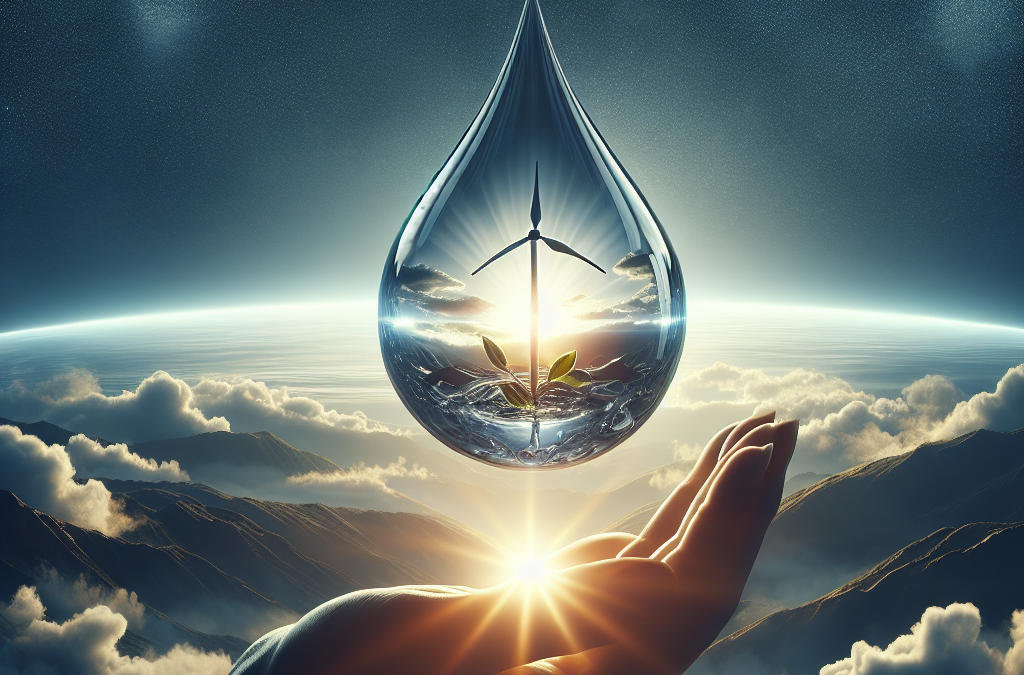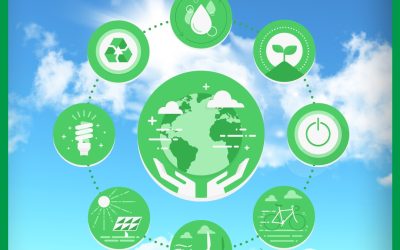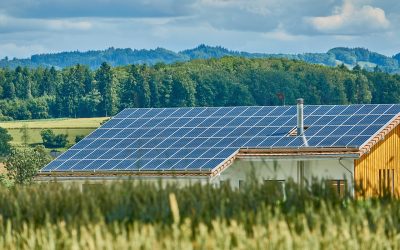Imagine a future where energy production doesn’t come at the cost of water scarcity. A future where we can reduce the amount of water used in the generation of electricity and the extraction of fossil fuels. This is not just wishful thinking; it’s a reality that we are inching closer to achieving. In recent years, significant efforts have been made to address the issue of energy-related water consumption, resulting in innovative technologies and policies that aim to minimize this impact. This article explores the current state of reduction in energy-related water consumption and the promising strategies that are shaping a more sustainable future.
The Importance of Reducing Energy-Related Water Consumption
Water and energy are intricately connected in a complex relationship known as the water-energy nexus. The production and generation of energy require significant amounts of water, while the treatment and distribution of water require substantial energy inputs. This interdependence makes it crucial to prioritize the reduction of water consumption in the energy sector. By doing so, we can minimize both the environmental impacts and economic implications associated with excessive water usage in energy production.
The Nexus Between Energy and Water
The water-energy nexus refers to the interrelationship between water and energy systems, where the production, distribution, and consumption of water and energy are interconnected. Water is essential for energy production, as it is used in various processes, including fuel extraction, power generation, and cooling systems. On the other hand, energy is required to treat, distribute, and recycle water. This intricate relationship emphasizes the need for sustainable practices and conservation efforts to reduce the strain on both resources.
Environmental Impacts of High Water Consumption in Energy Production
The excessive use of water in energy production has severe environmental consequences. One significant impact is the depletion of freshwater sources, leading to reduced availability for other purposes such as agriculture, domestic use, and ecosystem maintenance. Moreover, the withdrawal of large volumes of water from rivers, lakes, and underground sources can disrupt aquatic ecosystems, affecting fish populations and the overall health of ecosystems.
Additionally, the discharge of heated water into natural water bodies from cooling systems can harm aquatic life by altering the temperature and decreasing oxygen levels, leading to a decrease in biodiversity. Furthermore, the extraction of fossil fuels, such as coal and natural gas, can pollute water sources through contamination and spills, posing risks to human health and the environment.
Economic Implications of Excessive Water Usage in the Energy Sector
Excessive water usage in the energy sector also carries significant economic implications. The high water demand places a strain on water supply systems, potentially leading to higher water costs for both households and industries. Moreover, energy production requires substantial financial investments to secure water supplies and maintain cooling systems, further increasing the overall operational costs.
Furthermore, the reliance on water-intensive energy production methods can make regions vulnerable to water scarcity or droughts. In such cases, energy production may be forced to reduce or halt operations, leading to power shortages and economic disruptions. By reducing water consumption in the energy sector, we can mitigate the economic risks associated with water scarcity and enhance the overall resilience of energy systems.
Technological Innovations for Water Conservation in Energy Production
Advancements in technology have paved the way for various innovative approaches to water conservation in energy production. These advancements focus on improving cooling systems, developing waterless fracking techniques in the oil and gas industry, and enhancing hydroelectric power generation processes.
Advancements in Cooling Systems
Cooling systems play a pivotal role in energy production, particularly in thermal power plants. Traditionally, these systems rely on water-intensive cooling methods that can consume large volumes of water. However, technological innovations have brought about dry cooling technologies that reduce water consumption significantly. These systems utilize air or alternative coolants instead of water, thus minimizing the water requirements and mitigating the environmental impacts associated with water use in energy generation.
Waterless Fracking Techniques in the Oil and Gas Industry
In the oil and gas industry, hydraulic fracturing, or fracking, has been a major contributor to water consumption. However, advancements in technology have allowed for the development of waterless fracking techniques. These techniques utilize non-aqueous fluids or alternative fracking methods that minimize the reliance on fresh water, thereby reducing the environmental impacts on water resources.
Improved Hydroelectric Power Generation Processes
Hydroelectric power generation, while renewable, can have substantial effects on water ecosystems. However, technological innovations have led to improved turbines and dams designed to minimize the ecological impact of hydroelectric power generation. These advancements aim to optimize energy production while ensuring the preservation and sustainable use of water resources.
Government Policies and Regulations Promoting Water Conservation in the Energy Sector
To address the issue of water consumption in the energy sector, governments around the world have implemented policies and regulations aimed at promoting water conservation. These policies include international frameworks and agreements as well as national water-energy strategies.
International Frameworks and Agreements
International initiatives such as the United Nations Sustainable Development Goals (SDGs) recognize the importance of the water-energy nexus and call for sustainable practices in both sectors. The SDGs emphasize the need for integrated approaches to water and energy management and urge countries to prioritize water and energy efficiency as well as the sustainable use of resources.
Furthermore, organizations like the United Nations Framework Convention on Climate Change (UNFCCC) promote international cooperation to address climate change issues, including water and energy management. These frameworks highlight the importance of collaboration between nations for effective water conservation in the energy sector.
National Water-Energy Strategies
Many countries have developed their own national water-energy strategies to tackle the issue of excessive water consumption. These strategies prioritize water conservation through various means, such as setting targets for water and energy efficiency, implementing regulations for water use in the energy sector, and providing financial incentives for companies to adopt water-saving technologies and practices. National strategies serve as a roadmap for integrating sustainability principles into energy production and ensuring the responsible use of water resources.
Efficiency Measures in Energy Generation to Reduce Water Consumption
Efficiency measures in energy generation are essential for reducing water consumption. These measures focus on optimizing combined heat and power (CHP) systems, adopting dry cooling technologies for thermal power plants, and minimizing water losses through leakage prevention in pipelines.
Optimizing Combined Heat and Power (CHP) Systems
Combined heat and power (CHP) systems, also known as cogeneration, provide a more efficient way of generating electricity and heat simultaneously. By utilizing waste heat that is typically wasted in conventional power plants, CHP systems can significantly reduce the water requirements for power generation. This energy-efficient approach maximizes the use of resources and minimizes water consumption, making it an effective means of conserving water in the energy sector.
Adoption of Dry Cooling Technologies for Thermal Power Plants
Dry cooling technologies offer a promising solution for reducing water consumption in thermal power plants. These technologies employ air cooling instead of water, eliminating or minimizing the need for water-intensive cooling systems. By adopting dry cooling technologies, power plants can reduce their reliance on freshwater sources, minimize environmental impacts, and enhance overall water conservation efforts.
Minimizing Water Losses through Leakage Prevention in Pipelines
Water losses through leakage in pipelines not only waste a precious resource but also contribute to increased energy consumption for water treatment and distribution. By implementing measures to prevent leakage and improve pipeline efficiency, water losses can be minimized. This, in turn, decreases the energy required for pumping and treatment, resulting in reduced overall water and energy consumption.
Renewable Energy Sources and their Water Conservation Benefits
In addition to implementing efficiency measures, shifting towards renewable energy sources offers significant water conservation benefits. Solar power, wind energy, and geothermal energy all offer advantages over traditional energy sources in terms of limited water requirements.
Solar Power and Water Efficiency
Solar power is an increasingly popular renewable energy source that boasts a key advantage in terms of water efficiency. Unlike thermal power plants that rely on water for cooling, photovoltaic solar panels do not require water for electricity generation. By harnessing the power of sunlight, solar energy generation reduces the pressure on water resources and promotes sustainable energy production.
Wind Energy and Limited Water Requirements
Wind energy is another renewable energy source that consumes minimal water, making it an environmentally friendly option. Wind turbines generate electricity through the movement of wind without the need for water-intensive processes. By incorporating wind energy into power generation, we can further reduce the water demands of the energy sector and mitigate the environmental impacts associated with water consumption.
Geothermal Energy as a Sustainable Water-Saving Alternative
Geothermal energy utilizes heat from the Earth’s interior to generate electricity, offering a sustainable energy source with minimal water requirements. Unlike traditional power plants that use large amounts of water for cooling, geothermal power generation relies on closed-loop systems that recirculate the working fluid. This closed-loop method significantly reduces water consumption, making geothermal energy an attractive option for water-efficient energy production.
Incentive Programs for Energy Companies to Reduce Water Usage
To encourage energy companies to prioritize water conservation, various incentive programs have been implemented. These programs provide financial incentives, tax breaks, and rebates for implementing water conservation measures and adopting water-efficient practices.
Financial Incentives for Water-Efficient Practices
Government agencies or utility providers often offer financial incentives to energy companies that implement water-efficient practices. These incentives can include grants, subsidies, or low-interest loans to support the adoption of technologies and practices that reduce water consumption. By providing financial support, governments can incentivize energy companies to invest in water-saving initiatives and drive positive change in the sector.
Tax Breaks and Rebates for Implementing Water Conservation Measures
Tax breaks and rebates are additional incentives for energy companies to reduce water usage. Governments may offer tax credits or exemptions for energy companies that implement water conservation measures or invest in water-saving technologies. Similarly, utility providers may offer rebates or reduced rates to companies that demonstrate measurable reductions in water consumption. These incentives help offset the costs of implementing water conservation measures and encourage companies to adopt sustainable practices.
The Role of Public Awareness and Education in Reducing Energy-Related Water Consumption
Public awareness and education play a crucial role in reducing energy-related water consumption. By educating individuals about the water-energy nexus and the importance of conservation, we can encourage behavioral changes and individual actions that promote sustainable water and energy practices.
Educational Campaigns about the Water-Energy Nexus
Educational campaigns that highlight the interrelationship between water and energy can raise awareness and promote understanding of the need for conservation. These campaigns can target various stakeholders, including the general public, students, policymakers, and industry professionals, providing them with knowledge about the impacts of excessive water usage and the importance of adopting water-efficient practices.
Encouraging Individual Actions for Conservation
Empowering individuals to take action is vital in reducing energy-related water consumption. Through educational programs and public outreach, individuals can be encouraged to implement water-saving practices in their daily lives, such as reducing water consumption at home, practicing water-efficient gardening, and supporting renewable energy initiatives. By promoting individual responsibility, we can collectively make a significant impact on conserving water in the energy sector.
Raising Awareness about the Environmental and Economic Benefits
Raising awareness about the environmental and economic benefits of reducing energy-related water consumption is essential in mobilizing public support for conservation efforts. By highlighting the positive impacts, such as water resource preservation, reduced pollution, and cost savings, individuals can better understand the significance of their actions and the role they play in conserving water and protecting the environment.
Challenges and Barriers in Achieving Water Conservation in the Energy Sector
Despite the importance of water conservation in the energy sector, several challenges and barriers hinder its widespread adoption. These challenges include a lack of coordination and integration between energy and water management, technological and financial limitations, as well as resistance to change and reluctance to adopt water-efficient practices.
Lack of Coordination and Integration between Energy and Water Management
One major barrier to achieving water conservation in the energy sector is the lack of coordination and integration between energy and water management. Often, energy and water management systems are treated as separate entities, leading to a siloed approach that overlooks the interconnected nature of these resources. To overcome this challenge, there is a need for improved collaboration and information sharing between energy and water stakeholders to develop and implement integrated solutions.
Technological and Financial Limitations
The adoption of water-efficient technologies and practices may be limited by technological and financial constraints. Developing and implementing innovative solutions for water conservation often require significant investments in research, development, and infrastructure upgrades. Additionally, transitioning to water-saving technologies may involve upfront costs that some companies may be unable or unwilling to bear. Overcoming these limitations will require financial incentives, technological advancements, and supportive policies that facilitate the adoption of water-efficient practices.
Resistance to Change and Reluctance to Adopt Water-Efficient Practices
Resistance to change and reluctance to adopt water-efficient practices can present significant barriers to achieving water conservation goals in the energy sector. Energy companies may be hesitant to deviate from traditional methods, fearing potential disruptions or uncertainties associated with implementing new technologies or practices. Overcoming this challenge requires targeted education and awareness campaigns, demonstrating the benefits of water conservation, and showcasing success stories within the industry.
Case Studies: Successful Water Conservation Initiatives in the Energy Industry
Several successful water conservation initiatives in the energy industry serve as examples of effective strategies for reducing water consumption.
California’s Water Conservation Programs for Power Plants
California has been at the forefront of implementing water conservation measures in the energy sector, given the state’s frequent water scarcity challenges. In response, the California Energy Commission (CEC) and the California Public Utilities Commission (CPUC) have developed programs and regulations to promote water conservation in power plant operations. These initiatives include mandatory water use reporting, efficiency measures in cooling systems, and financial incentives for implementing water-efficient technologies. These efforts have resulted in significant reductions in water usage in the state’s power generation facilities.
Efforts of Large Energy Companies in Implementing Water-Saving Strategies
Large energy companies have also taken proactive measures to reduce water usage and promote water conservation. For example, ExxonMobil has implemented innovative technologies in its operations to minimize water consumption. This includes using advanced water treatment and recycling systems to reduce freshwater intake and implementing waterless fracking techniques in natural gas extraction. Similarly, General Electric has developed advanced cooling solutions for power plants, such as hybrid systems that combine wet and dry cooling methods to achieve significant water savings.
These case studies demonstrate that effective water conservation initiatives can be implemented at both regulatory and company levels, showcasing the feasibility of reducing water consumption in the energy sector.
Future Outlook and Potential for Further Reduction in Energy-Related Water Consumption
As we look to the future, there is significant potential for further reductions in energy-related water consumption. Emerging technologies and innovations, integration of water and energy planning, and collaboration and partnerships for sustainable water-energy solutions are key areas that offer promise for achieving water conservation goals.
Emerging Technologies and Innovations
Advancements in technology hold immense potential for further reducing water consumption in the energy sector. Ongoing research and development efforts are focused on creating more efficient cooling systems, waterless energy production methods, and advanced wastewater treatment technologies. These emerging technologies, such as membrane distillation and desalination, could revolutionize the way we use and conserve water in energy production.
Integration of Water and Energy Planning
The integration of water and energy planning is crucial for optimizing resource use and minimizing environmental impacts. By considering water availability and consumption in energy planning processes, policymakers and stakeholders can identify synergies and develop strategies that promote water conservation in conjunction with energy generation. Integrated planning can lead to innovative solutions and more sustainable practices in both sectors.
Collaboration and Partnerships for Sustainable Water-Energy Solutions
Collaboration and partnerships between governments, industries, research institutions, and communities are key to achieving sustainable water-energy solutions. These collaborations can foster knowledge sharing, technological advancements, and financial support for water conservation initiatives. By working together, stakeholders can leverage their expertise and resources to drive meaningful change and accelerate the adoption of water-efficient practices in the energy sector.
In conclusion, the importance of reducing energy-related water consumption cannot be overstated. The water-energy nexus, environmental impacts, economic implications, and social benefits all underscore the need for concerted efforts towards water conservation in the energy sector. Technological innovations, government policies, efficiency measures, renewable energy sources, incentive programs, public awareness, and collaboration will all play vital roles in achieving significant reductions in water consumption while ensuring a sustainable and resilient energy future. By prioritizing these efforts, we can pave the way for a more water-efficient and environmentally responsible energy industry.










